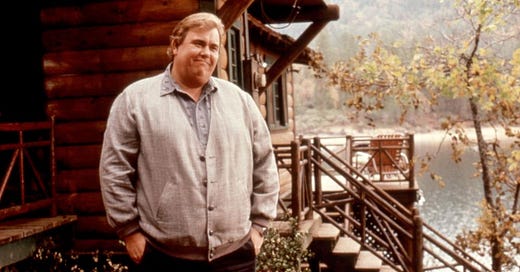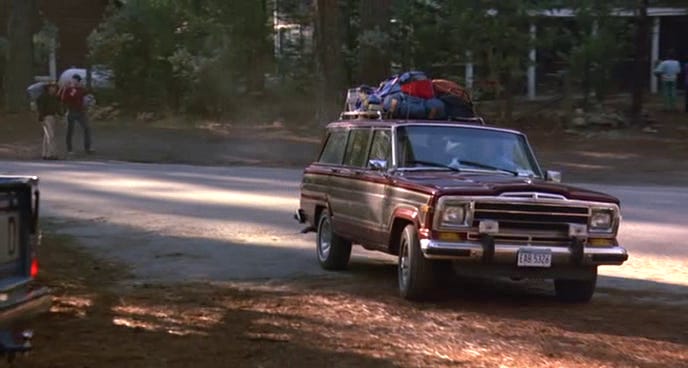I’ve spent too many summer days in New York City at this point in my life. I know that because when the subway floods during a big storm, tourists are everywhere, and the smells—oh, the smells!—mingle together to create a toxic perfume of weed, cooked meats, and old garbage, I just laugh now. It’s all comical. You have to go “full Joker mode” in order to live here, especially in the summer. You have no choice but to embrace the chaos and try not to be so serious about feeling like somebody poured a bucket of chum water all over you after spending ten minutes outside.
I say this knowing there is another way. I’ve experienced it. Many of my early summers were spent in the backyard of the Chicagoland area, the forest preserves of Wisconsin, and by lakes and other bodies of water all over the Midwest. It’s a different sort of life, and sometimes I miss it. I know most New Yorkers try to make it to Montauk or the Cape between Memorial and Labor Day, but what I wouldn’t give for a week with a patch of grass and a little shady terrace somewhere in Cook or Lake County in July. Midwestern summers are unbeatable to me. Sure, they don’t have the same seafood selection you might get in Massachusetts or Maine, and I’ve spent some beautiful summertime evenings in the South, but anything you might think that’s lacking in a Midwestern summer is exactly what makes it so perfect. It’s all about the ease. And that’s why I’ll inevitably end up watching The Great Outdoors at least once every summer. No movie can conjure up that feeling quite like it.
Released in 1988, it took years for me to find out the film was considered a disappointment since I was 8 that year, and saw it on VHS not long after it was in theaters. It was a different sort of film for John Hughes, with the only teen drama in the movie coming from young Buck (Chris Young) trying to woo townie Cammie (Lucy Deakins), with the latter thinking the out-of-towner is just another love and leave type. And, let’s face it: he probably was. I’m guessing the two of them maybe kept in touch for a few years after that summer, but that was it.
I’m digressing here with my fan fiction. The point of this is when you strip away the story of John Candy’s Chet trying to spend a peaceful summer in a cabin with his immediate family, only to have it ruined by his brother-in-law, Roman Craig (Dan Aykroyd), one of the all-time great yuppie dicks in cinematic history, you get a lot to appreciate. The film was shot at Ducey's Bass Lake Lodge in California, but I had to wait until the Internet came along to find that out. I just figured it was some eastern Wisconsin lake town, the sort I find myself missing when it’s a warm Friday night and the Germans renting the apartment above me are partying for 48 hours straight. Sure, The Great Outdoors is a comedy filled with Chet crushing a massive steak (the Old 96er) and an angry bear with its ass hair blown off, but it’s also quaint.
Oh yeah, it also features two of my favorite cars ever: Chet’s Jeep Grand Wagoneer and Roman’s Mercedes 560SEL. You have the two cars I’d likely put up at the top of my all-time wish list, chill lake vibes, and Annette Bening’s Katie talking about the only way she ever gets off is by sitting on the washing machine during the spin cycle. But even if you didn’t have those things, I’d still love this movie. I’d still end up watching it every summer because it’s oddly relaxing because of the nostalgia factor, but it’s also the lack of any real drama that I love. You know nothing bad is going to happen to anybody in the film (except maybe to the bear, but I won’t ruin that for anybody who hasn’t seen it), that summer will come and go, and things will go back to the way they were. Roman will continue being crooked, Chet will continue to be good-natured, Buck will go back to high school and forget about his summer girlfriend, and the washing machine repairman will continue making house calls to the Craig home. But The Great Outdoors isn’t a movie concerned with any of that. The world you’re supposed to focus on is contained within 90 minutes. What happens after isn’t supposed to matter. Nothing of much consequence happens to anybody in the movie, and there’s something so wonderful about that. The Great Outdoors works as the perfect summer movie because it’s exactly what I miss about Midwestern summers: a totally fun, low-stakes experience.






Our family had a Grand Wagoneer growing up, and the way Great Outdoors contributed to the mythology of the GW as an iconic family vehicle can't be overstated. It definitely played a part in my parents buying one- it was even the same color as the one in the movie.
But to burst that bubble a bit, our GW was of course gorgeous but kind of a lemon. It had this weird idling problem that mechanics could never quite fix, and it was one of those cars there was a trick to starting. It was also unsurprisingly a shameful gas guzzler.
My wife and I test drove one of the new Wagoneers when they first hit the market, even knowing it was too ridiculously large and expensive to be an option for us. It was very nice and plush, a true suburban assault vehicle. But it was a missed opportunity to not at least offer wood paneling as an option.
I always wanted to take a summer trip in one of those big wood paneled station wagons because of this movie and Harry and the Hendersons